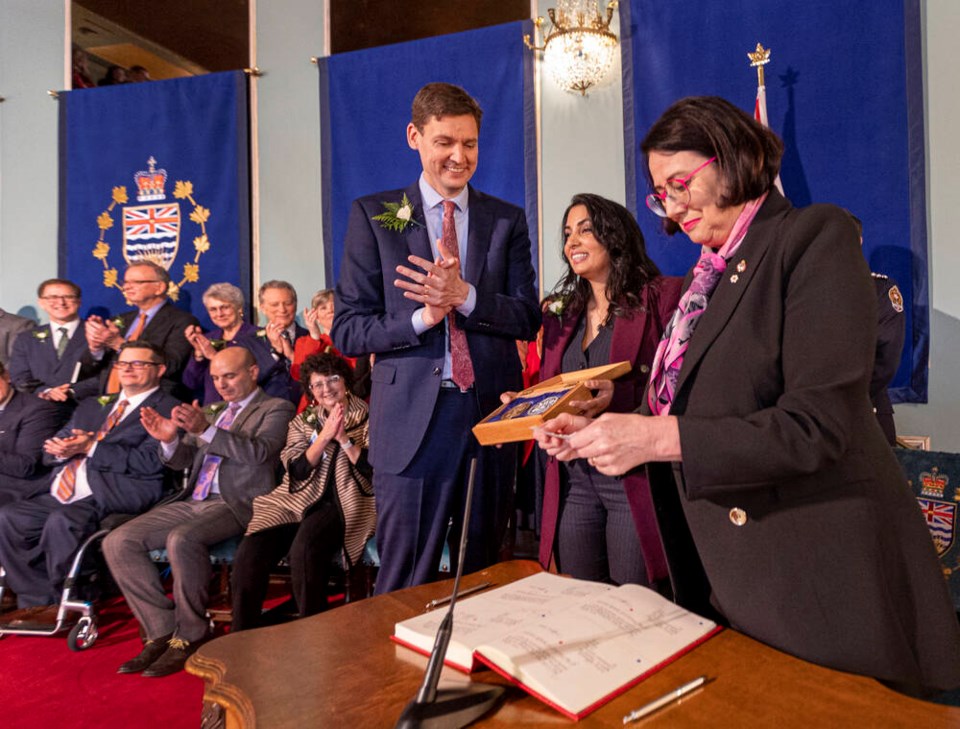At a time when the B.C. government is under pressure to take a tougher stance on repeat offenders, newly appointed Attorney General Niki Sharma is aiming to divert people out of the criminal justice system and address the overrepresentation of Indigenous people in the system.
Sharma is one of the newer MLAs in caucus, elected to represent Vancouver-Hastings in 2020. The 43-year-old mother of two made her mark as parliamentary secretary for community development and non-profits, and chair of the parliamentary committee on the toxic drug crisis.
As a result, a majority of MLAs in caucus floated her name to Eby as the top pick for attorney general.
Sharma, the first South Asian woman to serve as the province’s top lawyer, teared up during Wednesday’s swearing-in ceremony and when speaking to reporters afterward about why the position means so much to her.
“I think about all the women before me in my family that didn’t have the opportunity, that had sexism and racism stand in their way. And I carry those stories with me and it hit me today when I had my name called.”
Sharma, who was called to the bar in 2005 after completing law school at the University of Alberta, said when she represented residential school survivors, who often had to re-live the trauma as they went up against the federal government and the Catholic church in court, it “was a really big lesson on how legal systems can work for people and against people.”
Some are concerned that Sharma’s principles, shaped during the anti-racism activism of her early career, could clash with the recent reforms announced by Eby just days after he was sworn in as premier.
Accused by the B.C. Liberals of being “soft on crime” in the face of random violent attacks on unsuspecting victims, Eby announced new directives to Crown prosecutors stressing that repeat violent offenders should be kept in jail until trial. A few days later, Eby surprised social justice advocates by announcing $230 million in funding to hire more RCMP officers.
Benjamin Perrin, a professor in the Peter A. Allard School of Law at the University of British Columbia, said he sees “disturbing signs” that Eby is “catering to our basest fears” by increasing police resources and relying on “discredited tough-on-crime policies” to score political points.
The fact that Eby announced these major changes before he named his attorney general puts Sharma in a difficult position, Perrin said.
Asked about the directives to Crown counsel, Sharma said there’s room to jail violent offenders while at the same time addressing the root causes of crime, including mental health and addiction problems.
“I think that our strategy to do with Indigenous justice and figuring out how to reduce the impact of the criminal justice system on Indigenous people, is so important,” she said this week.
She said the government’s approach is to ensure supports are in place to keep people out of the criminal justice system, “to have better ways of helping people through the challenges they’re facing instead of criminalization.”
At the same time, Sharma acknowledged that violent crime is a problem in cities across Canada, which is why “when it comes to repeat violent offenders, that approach is to make sure that if there is violence that’s showing up, that person doesn’t have the ability to do that again.”
Angela MacDougall, executive director of Battered Women Support Services, worked with Sharma when she served on the board of directors for the Vancouver-based non-profit.
MacDougall, who has seen how marginalized women are also hurt by tough-on-crime policies, said “the challenge of our time is trying to manage this polarization over this notion of public safety, because it means different things to different communities.”
MacDougall is confident Sharma will bring a trauma-informed approach to criminal justice.
“I can’t imagine anybody is better positioned for this because of the challenges that we are facing in the province.”
Sharma and her three sisters grew up in Sparwood, a mining town in southeast B.C., where their parents settled after immigrating from India.
Sharma adopted her parents’ work ethic, watching her father start a small business after being laid off from the mining industry and marvelling at how her mother juggled her community volunteer roles promoting multiculturalism and the arts.
Edie Holland, Sharma’s Grade 7 teacher at Mountain View Elementary in 1989, said she was bright, hard-working and determined, skills she maintained throughout her career.
Holland was “not surprised at all” to hear the former Sparwood resident had ascended to one of the highest posts in Eby’s cabinet.



